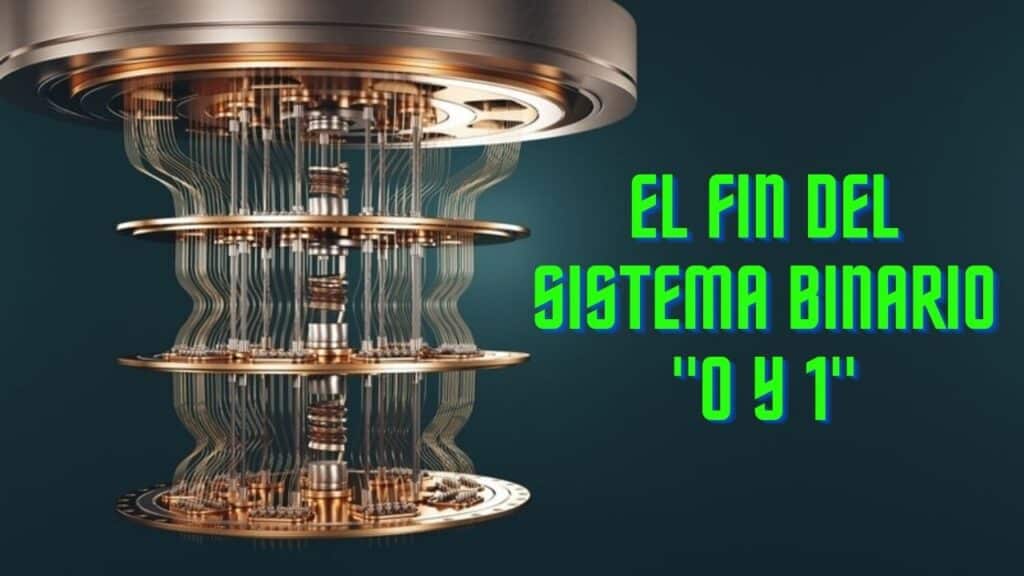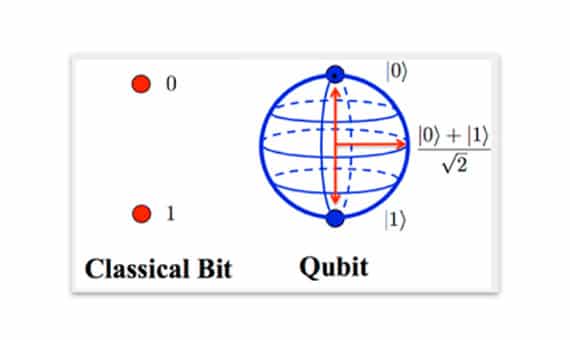What is a quantum computer?

Cuanto más nos acercamos a una computadora cuántica, más se convierte en una cuestión filosófica. El primer obstáculo es que la palabra "computadora" tiene un significado muy específico. En la década de 1980, un matemático estadounidense tuvo la visión de una computadora como un dispositivo que manipula la información como una serie de unos y ceros, o bits. En esencia, esto es lo que hace una computadora clásica. Una computadora cuántica, por otro lado, es un dispositivo que manipula la información como una serie de estados de la mecánica cuántica: 0 y 1, o apagado y encendido, o arriba y abajo. Esto es lo que hace una computadora cuántica.
Por cierto, la palabra "computadora" es una abreviatura de "máquina de computación" y no una referencia a la mecánica cuántica. Cuando decimos "computadora cuántica", nos referimos a "una máquina que utiliza la mecánica cuántica para calcular". Los físicos a menudo usan la palabra "computadora cuántica" como sinónimo de "procesador de información cuántica".
¿Cuál es la diferencia entre una computadora cuántica y una computadora clásica?
La mecánica cuántica nos dice que no podemos medir un sistema cuántico sin perturbarlo. Una computadora cuántica utiliza esta parte perturbadora del proceso de medición como el "bit" que controla el siguiente paso del cálculo.
Las computadoras clásicas, que usan cargas eléctricas para representar 0 y 1, no tienen este bit. Debemos insistir en este punto: una computadora clásica no tiene nada. La presencia o ausencia de un bit es la diferencia fundamental entre una computadora cuántica y una computadora clásica.
What is quantum entanglement?
El entrelazamiento cuántico significa que dos sistemas cuánticos están conectados de tal manera que el estado de uno de ellos depende del estado del otro. Por ejemplo, si uno de estos sistemas cuánticos está en el estado de 0, el otro debe estar en el estado de 1. Y viceversa.
El entrelazamiento cuántico es el vínculo mecánico cuántico entre dos sistemas cuánticos. Es el mecanismo que permite que la computadora cuántica sea más rápida que cualquier computadora clásica. La diferencia entre el entrelazamiento cuántico y el enlace clásico es que el enlace clásico se establece mediante cables u otros dispositivos, mientras que el enlace cuántico se establece mediante sistemas cuánticos que realizan mediciones entre sí.
What is the role of quantum entanglement in quantum computing?
Volvamos a la computadora cuántica de tres qubit discutida anteriormente. Si escribimos 1 para el estado del primer qubit, 0 para el estado del segundo qubit y 0 para el estado del tercer qubit, hay dos conjuntos de tres combinaciones de unos y ceros que son iguales, excepto que el la tercera combinación está al revés:
1 0 0 1 0 1 0 1
0 1 0 1 0 0 0 0
The difference between these two sets of combinations does not depend on the order in which they are written. The order does not matter. But the difference between these two sets of combinations is exactly the same as the difference between the next two sets of combinations:
0 0 0 1 0 0 0 0
0 1 0 1 0 1 0 1

Esta es la diferencia llamada entrelazamiento cuántico. La diferencia no depende del orden en que se escriban las combinaciones. Y esta es exactamente la misma diferencia que en el caso clásico. Es decir, también hay un enredo en el caso clásico.
Why is quantum entanglement useful for quantum computing?
Supongamos que tenemos dos bits clásicos, que llamaremos "izquierda" y "derecha". Supondremos que el estado del bit izquierdo es siempre 0, mientras que el estado del bit derecho es 1 con probabilidad 0.5. Y los estados de los dos bits están conectados. Supondremos que cuando el bit de la izquierda está en el estado de 0, el bit de la derecha está en el estado de 1 con una probabilidad de 0.5. Este es el enredo clásico.
Ahora, suponga que queremos saber si el bit de la izquierda está en el estado de 0 o en el estado de 1. Podemos simplemente verificar si el bit de la derecha está en el estado de 1 o en el estado de 0. Este es el procedimiento que se utiliza en la computadora clásica. En este caso, el bit de la izquierda no influye en el bit de la derecha y los dos bits están separados.
En el caso cuántico, la situación es diferente. Suponga que hay una computadora cuántica de tres qubits, con los tres qubits llamados "izquierdo", "medio" y "derecho". Suponga que el estado del qubit izquierdo es 1, el estado del qubit medio es 0 y el estado del qubit derecho es 1. Entonces la probabilidad de obtener el resultado "1" es 0.5, y la probabilidad de obtener el resultado "0"

En teoría una computadora cuántica hara que los cubits sustituyan a los bits, que ayudara a las computadoras a realizar cálculos matemáticos más complejos en menos tiempo. Y a la vez serán capaz de volver obsoleto al sistema binario que ya conocemos. Por lo que se tendrá que reinventar toda una nueva lógica para el uso de nuevos ordenadores.
Este nuevo sistema tendrá mucho impacto a nivel global, ya que destruirá prácticamente al sistema binario, y, por lo tanto, la seguridad que conocemos podrá ser vulnerada por las computadoras cuánticas, hasta el mismo Pentágono podrá quedar expuesto. Es por eso que antes de que salgan al mercado, todas las dependencias y empresas importantes tendrán que adaptarse al nuevo cambio forzosamente, ya que en manos de las personas equivocadas hará que pierdan miles de dólares.
 We recommend you to read:Install kali linux 2018 in VM WARE virtual machine
We recommend you to read:Install kali linux 2018 in VM WARE virtual machine
Open in new browser tab

Write us a comment: